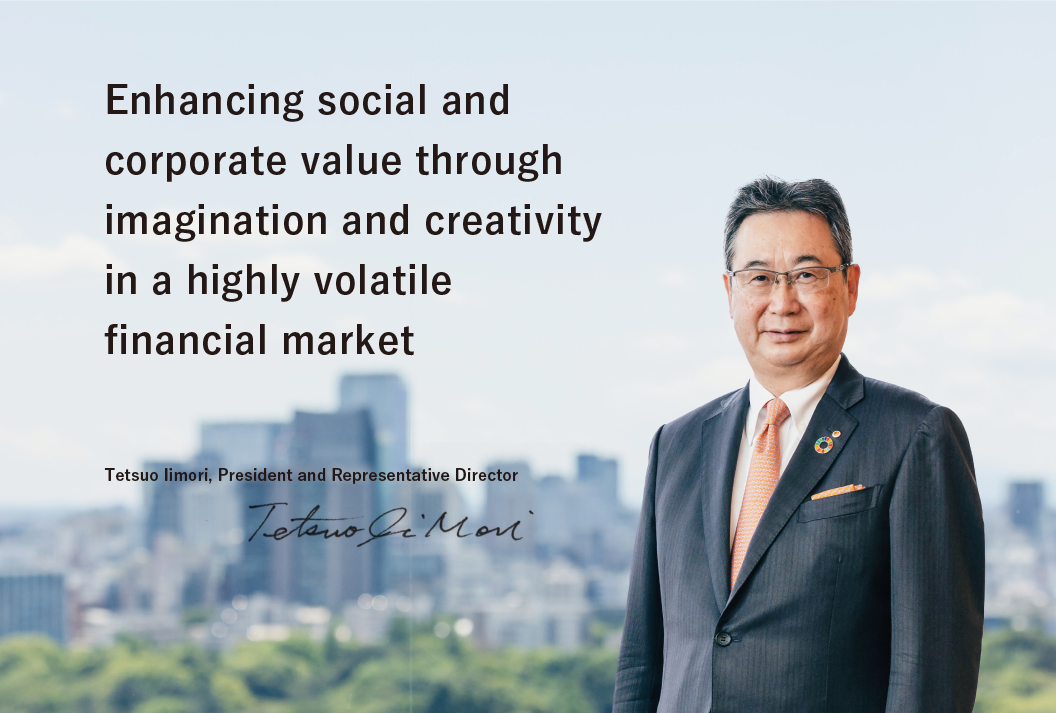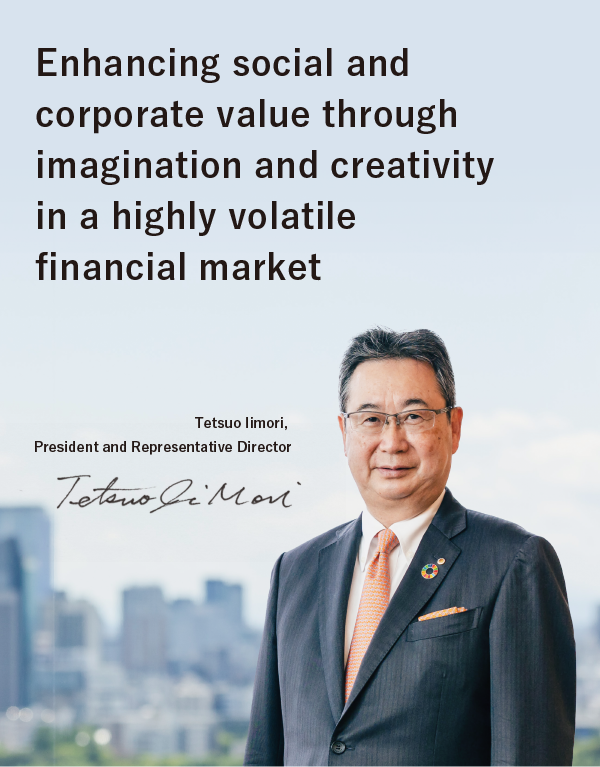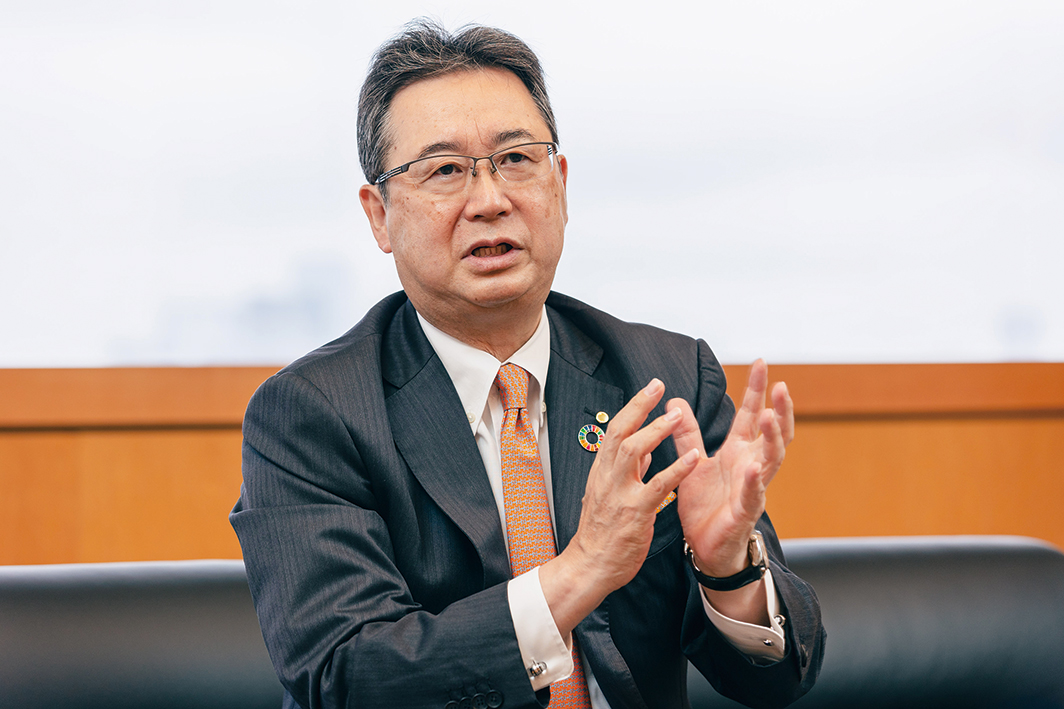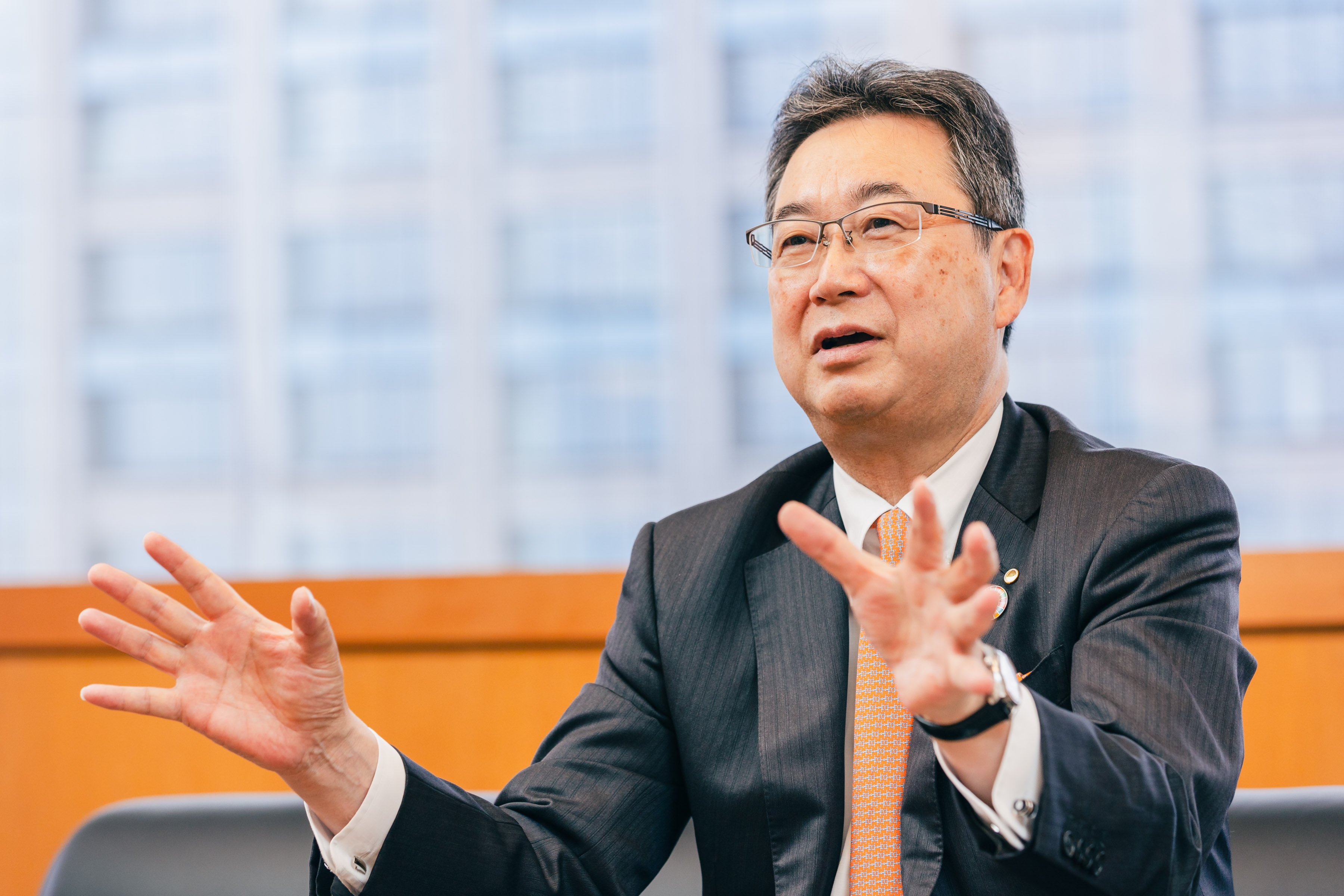Investor Relations(IR)
Integrated Report
Message from the President


The History of Orico
Our Company was founded in 1954, the year before Japan began to experience high economic growth. From that point onward, the Japanese economy grew at an annual rate of about 10% until the first oil shock in 1973, and subsequently entered a stable growth phase of approximately 5%. During this extended period, the expansion of personal consumption buoyed Japan's economic growth. To my mind, the banks were not actually the ones who supported consumer spending during Japan's period of rapid economic growth. The function of banks was to channel deposits from individuals into capital for smokestack industries. The provision of personal credit that fueled personal consumption was, in fact, the role of our consumer credit and finance industry. Post-war consumption of the so-called "Three Sacred Treasures" (black-and-white TVs, refrigerators, and washing machines) and the “three Cs” that followed (cars, color TVs, and air conditioners) was stimulated and expanded by the consumer credit industry granting credit to individuals, thus contributing to Japan's economic growth. However, with the collapse of the bubble economy in the 1990s, our industry took a significant hit from the real estate bubble, compounded by the issue of over-lending and multiple debtors. The repercussions of unnecessary funding and providing what should not have been provided came full circle. Our Company considers this a painful lesson.
Between our founding and the present, we have followed a path of enhancing corporate value by creating social value. Therefore, for us, enhancing corporate value is the outcome, and what should always be at the forefront of our minds is whether this coincides with creating social value. This philosophy is reflected in our current medium-term management plan. We have positioned the coexistence of improving social value and corporate value—in other words, sustainability—at the core of our management. I have also infused my own strong convictions into this endeavor. I have spent much of my career as a banker. I began my career at a bank as a fresh graduate in 1984. This was during Japan's transition from a period of stable economic growth to the bubble era. Banks had started to get involved in housing loans and the like, but when I entered the industry, they were not yet proactively lending to individuals. Afterwards, I confronted the challenges facing Japan's finance sector on the job, such as the financial crisis of 1997 with the collapse of Yamaichi Securities, and the birth of mega-banks through mergers and integration. During my student days, I studied Japanese economic history in a public finance seminar. Since becoming a businessman, I have found myself in the midst of financial history and have witnessed significant changes. I felt that the business of finance, which should be inextricably linked to the dynamics of the world, was becoming increasingly disconnected from them. After all, it is important for the financial industry to continue to operate in tandem with the real economy. Ever since leaving the banking world and joining the Company, I have come to appreciate the excitement and dynamism of finance integrated with goods and services.
Future Strategy
Currently, the financial market is in turbulent flux, driven by the massive funds supplied to the market as a result of ongoing global financial easing, causing finance to drift away from the needs of goods and people mentioned previously. Looking toward 2030 and beyond, I think that countries will begin to explore exits from financial easing, reducing the supply of funds in the market and raising interest rates. It is a well-known fact that excess funds in the market can adversely affect commodity market conditions and inflationary pressures. However, since we have carried out unprecedented large-scale easing around the globe, the result of this exit strategy remains uncertain, and the financial environment will become unstable. For our Company to consistently generate stable profits in such a high-volatility management environment, we believe it is vital to focus on two aspects: creating "truly necessary finance" closely aligned with goods and consumption, and building a business model of "de-financing" that does not overly rely on interest income and expenditures. Additionally, there is a significant societal role to be played in the domain of small enterprises in the BtoB sector. 99.7% of companies in Japan are small- and medium-sized enterprises (SMEs). People working within these SMEs constitute 68.8% of all industries in Japan. With the streamlining of distribution mechanisms and the advancement of digitization, even these SMEs are increasingly placing orders for parts and other items online. The once problematic and complex distribution structure in Japan has been simplified, and local wholesalers are rapidly disappearing. However, the function of credit extensions (selling on credit), which was traditionally handled by these wholesalers, is being lost at the same time. With the SME market as our target, we aim to substantially enhance productivity by issuing business credit cards, and by providing payment and billing mechanisms online, we seek to supplement the credit for SMEs and improve tasks such as accounting operations.
No one knows exactly what the future holds. However, by constantly thinking about what value we can create for society and working with that in mind, we can envision our future path. In this regard, I deem talent development as the most critical aspect of all. We must imagine the future and then create what we have imagined. Starting in fiscal year 2023, we initiated a new human resource system that focuses on cultivating talent that possesses both imagination and creativity. The concept of a "job" pertains to paying compensation that matches the results of the assigned work. This new human resource system is built not around jobs, but around assessing and rewarding the degree to which “missions” are accomplished. So what is a mission? At our Company, we define this as creating value for customers, employees, and the market (society). We aim to expand our business operations based on this mission-driven mindset and evaluate our talent accordingly, channeling our efforts into the creation of value for our entire Company moving forward.
The Characteristics and Strengths of the Orico Group

The significance, and strength, of our Group is our customer base. We have approximately 11 million credit card holders, 850,000 member merchants in our installment credit business, 565 allied financial institutions, and 1.33 million customers provided with rent settlement guarantees. In addition to this unique customer base, another significant feature is the wide variety of financial functions we offer. Besides our core businesses like individual installment sales, credit cards, and bank loan guarantees, we also have an industry-leading scale in rent settlement guarantees, and our transaction volume for BtoB accounts receivable settlement guarantees is also substantial.
I believe that the key to further refining our strengths and differentiating ourselves from our competitors will be to consolidate the customer base we have cultivated through our broad range of financial services, rather than viewing them as separate entities.
Japanʼs population has been shrinking since peaking in 2008. The productive age population, which constitutes our customer base, is expected to drop from the peak of 87.16 million in 1995 to 68.75 million by 2030. This is a business environment where growth strategies cannot be outlined solely on personal credit. Meanwhile, if you look at BtoB transactions, the market size is said to exceed 1,000 trillion yen, and even SMEs alone are twice the size of the personal cashless market. This is where our strength comes into play—namely, our close relationships with Mizuho Financial Group and ITOCHU Corporation. Mizuho Financial Group conducts transactions with hundreds of thousands of SMEs. ITOCHU Corporation plays a role in distribution. We believe that these relationships will form a robust foundation that supports our growth strategy going forward, with a focus on the domestic BtoB domain.
Naturally, the overseas market is also promising. In particular, we are expanding our business in Southeast Asia, and we expect a significant business expansion in this area in the future. In Southeast Asia, which boasts a high economic growth rate and geopolitical stability, our transaction volume in Thailand increased by 70% compared to the previous year, by 95% in the Philippines, and by 230% in Indonesia, showing great momentum. Last year in Indonesia, we launched a "certified used car scheme" with a local Honda dealer. We will contribute to nurturing a sound market using quality-assured Japanese used cars as a foothold as we consider other financial developments. The fourth candidate country for entry is Vietnam, with nearly 100 million people, a young average age, and a national average income exceeding 4,000 dollars. Automobile sales are expected to continue growing beyond the current level of 500,000 units. Against the backdrop of economic growth and recovery from COVID-19, we will allocate assets to the high-profit Southeast Asia market.
Reflecting on the First Year of the Medium-Term Management Plan
Three years have passed since I assumed the position of President in 2020. The first thing we did after deciding to go public in the prime market of the Tokyo Stock Exchange was to strengthen our governance structure. We transitioned toward being a company with an Audit and Supervisory Committee and delegated significant authority to the executive side. Simultaneously, we built a system in the Board of Directors where particular emphasis was placed on strategic planning and subsequent monitoring and supervision.
During this time, we achieved two-level improvements in our credit ratings with R&I and JCR by stabilizing and liberalizing procurement.
I mentioned earlier that we launched a new human resources system, but we placed particular focus on developing human resources with expertise in Digital Transformation (DX). We launched a three-year DX program training for all full-time employees, and almost everyone has already taken the introductory-level course in the first year. Both the chairperson and I have taken the course as well. Out of about 3,000 who passed the introductory course, about half are now advancing to the intermediate program. Human resources equipped with DX skills are steadily moving forward towards transforming existing businesses and creating new businesses utilizing DX.
That being said, I am aware that formulating measures to deal with increased costs due to rising interest rates in the installment credit business is a task that has yet to be addressed. I will not take measures to cover a smaller profit margin with quantity in the face of the risk of interest rate increases. It is essential to gain our customers' understanding of the cost increase and work on improving conditions while pursuing co-creation with our business partners. In addition to organizational restructuring to promote radical structural reforms such as the elimination of unprofitable transactions, we obtained authorization as a "Certified Comprehensive Credit Purchase Intermediary" newly established under the revised Installment Sales Act. We will also strive for thorough customer and member merchant management by making profits more visible for our stores and member merchants, as well as implementing and constructing an AI-based credit management system. By transforming unprofitable businesses into profitable ones and building a sustainable business model, we will achieve an ordinary profit of over 40 billion yen in the final fiscal year of the medium-term management plan in fiscal year 2024.
Enhancing Corporate Value

I recognize that our Price Book-value Ratio (PBR) as of the end of March 2023 falling below 1.0 presents a challenge. While striving to improve capital efficiency and raise ROE, I also wish to further reinforce our trust relationship with investors. This will be achieved by faithfully executing the strategies and policies laid out in our medium-term management plan so that our future growth prospects can be understood by the capital market.
The initiatives we are currently pursuing might only exist as a few lines on the page when we look back at history in the future. Nevertheless, it is precisely because of this possibility that I believe it is my role as a leader to continually search for something universal that contributes to enhancing social value.
To sustain the Company's growth, we will focus on nurturing talent endowed with imagination and creativity while constantly visualizing the landscape of the future and crafting a story aimed at success. I ask that all our stakeholders look forward to what we have to offer in the future.